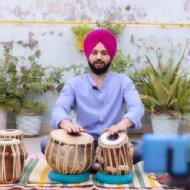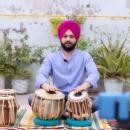
Laxmi Nagar Block D, Delhi, India - 110092.
95
Details verified of Sumeet✕
 Identity
Identity
 Education
Education
Know how UrbanPro verifies Tutor details
Identity is verified based on matching the details uploaded by the Tutor with government databases.


Punjabi
Hindi
English
![]() Gandharv mahavidyalay 2005
Gandharv mahavidyalay 2005
Visharad in Tabla
Laxmi Nagar Block D, Delhi, India - 110092
![]() ID Verified
ID Verified
![]() Phone Verified
Phone Verified
![]() Email Verified
Email Verified
![]() Facebook Verified
Facebook Verified
Report this Profile
Is this listing inaccurate or duplicate? Any other problem?
Please tell us about the problem and we will fix it.
Class Location
![]() Online (video chat via skype, google hangout etc)
Online (video chat via skype, google hangout etc)
![]() Student's Home
Student's Home
![]() Tutor's Home
Tutor's Home
Years of Experience in Tabla Classes
15
Age groups catered to
Below 10 yrs, 10 yrs to 15 yrs, Above 25 yrs, 16 yrs to 25 yrs
Class strength catered to
One on one/ Private Tutions, Group Classes
Teaching Experience in detail in Tabla Classes
* start with description of subject. * Teach different tabla ghranas styles. * Teach under guru-shisya parmpra. * teaching style is easily understand for beginners and advance students. * easy methods and techniques develop in my subject. * love and live for my subject. * Sometimes we learn while a teacher from our student
Class Location
![]() Online (video chat via skype, google hangout etc)
Online (video chat via skype, google hangout etc)
![]() Student's Home
Student's Home
![]() Tutor's Home
Tutor's Home
Years of Experience in Dholak Classes
13
Age groups catered to
Below 10 yrs, 10 yrs to 15 yrs, Above 25 yrs, 16 yrs to 25 yrs
Class strength catered to
One on one/ Private Tutions, Group Classes
Teaching Experience in detail in Dholak Classes
Teach classical, semi-classical and light music. Develop base of student to play in right techniques. Build stamina and concentration of student. Teach different exercise of fingers in Dholak bol syllabus.
Class Location
![]() Online (video chat via skype, google hangout etc)
Online (video chat via skype, google hangout etc)
![]() Student's Home
Student's Home
![]() Tutor's Home
Tutor's Home
Years of Experience in Class I-V Tuition
13
NIOS Subjects taught
Punjabi
Board
State, NIOS, DAV board, CBSE
State boards taught
Uttar Pradesh State Board, Punjab State Board, Delhi State Board
CBSE Subjects taught
Punjabi
Experience in School or College
I have teached many of University and school students for their gurmukhi subject.
Taught in School or College
Yes
State Syllabus Subjects taught
Punjabi
Teaching Experience in detail in Class I-V Tuition
Experienced Punjabi or gurmukhi teacher with 13 years of experience of teaching. I can teach students according to capacity or understanding of the student. Makes easy techniques which can easily understand by the students and perform well in examination or in the class.
4.9 out of 5 26 reviews
Prashant Harde
Tabla
"Sumeet Sir Is expert in Tabla and is dedicated and passionate in imparting knowledge to his students. Highly recommended. "
Ritu Chawla
"I have a great experience with ishmeet ji. He is very good teacher with excellent talent. No doubt nice human being as well. "
Anindita
"Extremely polite and humble Guru. We are associated with him since last 3 years and my son has graduated from a novice to an advanced tabla player. Under Sumeet Sir's guidance, my son has won the best performance in Indian instrumental in his school. "
Poornima Menon
"My son is training with Sumit sir and thoroughly enjoys every class . Sir is very patient with kids and has guided my son very well. He looks forward to every session. "
1. Which classes do you teach?
I teach Class I-V Tuition, Dholak and Tabla Classes.
2. Do you provide a demo class?
Yes, I provide a paid demo class.
3. How many years of experience do you have?
I have been teaching for 15 years.
Answered on 31 Jul Learn Music/Instrumental Music/Indian Instrumental Music/Dholak
According to me and my understanding of both instruments just humble try to give details explained above both asked instruments.
Tabla and Dholak are both popular percussion instruments in Indian classical and folk music, but they have distinct differences:
1. Origin:
- Tabla: Originated in the Indian subcontinent, specifically in the Hindustani classical music tradition.
- Dholak: Originated in the Indian subcontinent, but is more commonly used in folk music and light classical music.
2. Instrument structure:
- Tabla: Consists of two drums, the dayan (treble drum) and the bayan (bass drum), made of wood or metal.
- Dholak: A single, two-headed drum made of wood or metal.
3. Sound production:
- Tabla: Produces sharp, crisp, and complex sounds due to the use of fingers and palms.
- Dholak: Produces deeper, more resonant sounds due to the use of palms and fingers.
4. Playing technique:
- Tabla: Requires intricate fingerwork and complex strokes.
- Dholak: Played with a more straightforward, energetic, and dynamic technique.
5. Music genres:
- Tabla: Used in Hindustani classical, light classical, and fusion music.
- Dholak: Used in folk, light classical, and devotional music.
6. Cultural significance:
- Tabla: Considered a sacred instrument in Hindustani classical music.
- Dholak: Used in various folk traditions and celebrations.
These differences reflect the unique characteristics and roles of each instrument in Indian music.
Answered on 13/09/2022 Learn Music/Instrumental Music/Indian Instrumental Music/Tabla
Answered on 13/08/2022 Learn Music/Instrumental Music/Indian Instrumental Music/Tabla
Answered on 13/08/2022 Learn Music/Instrumental Music/Indian Instrumental Music/Tabla
Answered on 13/06/2022 Learn Music/Instrumental Music/Indian Instrumental Music/Tabla
Class Location
![]() Online (video chat via skype, google hangout etc)
Online (video chat via skype, google hangout etc)
![]() Student's Home
Student's Home
![]() Tutor's Home
Tutor's Home
Years of Experience in Tabla Classes
15
Age groups catered to
Below 10 yrs, 10 yrs to 15 yrs, Above 25 yrs, 16 yrs to 25 yrs
Class strength catered to
One on one/ Private Tutions, Group Classes
Teaching Experience in detail in Tabla Classes
* start with description of subject. * Teach different tabla ghranas styles. * Teach under guru-shisya parmpra. * teaching style is easily understand for beginners and advance students. * easy methods and techniques develop in my subject. * love and live for my subject. * Sometimes we learn while a teacher from our student
Class Location
![]() Online (video chat via skype, google hangout etc)
Online (video chat via skype, google hangout etc)
![]() Student's Home
Student's Home
![]() Tutor's Home
Tutor's Home
Years of Experience in Dholak Classes
13
Age groups catered to
Below 10 yrs, 10 yrs to 15 yrs, Above 25 yrs, 16 yrs to 25 yrs
Class strength catered to
One on one/ Private Tutions, Group Classes
Teaching Experience in detail in Dholak Classes
Teach classical, semi-classical and light music. Develop base of student to play in right techniques. Build stamina and concentration of student. Teach different exercise of fingers in Dholak bol syllabus.
Class Location
![]() Online (video chat via skype, google hangout etc)
Online (video chat via skype, google hangout etc)
![]() Student's Home
Student's Home
![]() Tutor's Home
Tutor's Home
Years of Experience in Class I-V Tuition
13
NIOS Subjects taught
Punjabi
Board
State, NIOS, DAV board, CBSE
State boards taught
Uttar Pradesh State Board, Punjab State Board, Delhi State Board
CBSE Subjects taught
Punjabi
Experience in School or College
I have teached many of University and school students for their gurmukhi subject.
Taught in School or College
Yes
State Syllabus Subjects taught
Punjabi
Teaching Experience in detail in Class I-V Tuition
Experienced Punjabi or gurmukhi teacher with 13 years of experience of teaching. I can teach students according to capacity or understanding of the student. Makes easy techniques which can easily understand by the students and perform well in examination or in the class.
Answered on 31 Jul Learn Music/Instrumental Music/Indian Instrumental Music/Dholak
According to me and my understanding of both instruments just humble try to give details explained above both asked instruments.
Tabla and Dholak are both popular percussion instruments in Indian classical and folk music, but they have distinct differences:
1. Origin:
- Tabla: Originated in the Indian subcontinent, specifically in the Hindustani classical music tradition.
- Dholak: Originated in the Indian subcontinent, but is more commonly used in folk music and light classical music.
2. Instrument structure:
- Tabla: Consists of two drums, the dayan (treble drum) and the bayan (bass drum), made of wood or metal.
- Dholak: A single, two-headed drum made of wood or metal.
3. Sound production:
- Tabla: Produces sharp, crisp, and complex sounds due to the use of fingers and palms.
- Dholak: Produces deeper, more resonant sounds due to the use of palms and fingers.
4. Playing technique:
- Tabla: Requires intricate fingerwork and complex strokes.
- Dholak: Played with a more straightforward, energetic, and dynamic technique.
5. Music genres:
- Tabla: Used in Hindustani classical, light classical, and fusion music.
- Dholak: Used in folk, light classical, and devotional music.
6. Cultural significance:
- Tabla: Considered a sacred instrument in Hindustani classical music.
- Dholak: Used in various folk traditions and celebrations.
These differences reflect the unique characteristics and roles of each instrument in Indian music.
Answered on 13/09/2022 Learn Music/Instrumental Music/Indian Instrumental Music/Tabla
Answered on 13/08/2022 Learn Music/Instrumental Music/Indian Instrumental Music/Tabla
Answered on 13/08/2022 Learn Music/Instrumental Music/Indian Instrumental Music/Tabla
Answered on 13/06/2022 Learn Music/Instrumental Music/Indian Instrumental Music/Tabla

Share this Profile
Reply to 's review
Enter your reply*
Your reply has been successfully submitted.
Certified
The Certified badge indicates that the Tutor has received good amount of positive feedback from Students.